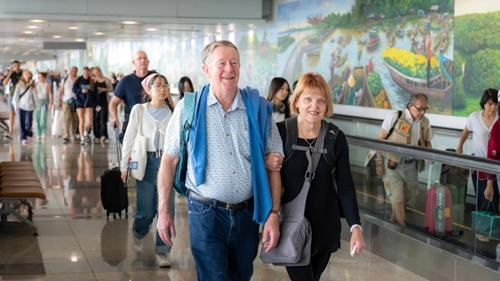During the first half of 2025, Noi Bai airport handled 16.5 million passenger movements and recorded over 100,000 takeoffs and landings. Notably, international terminal T2 processed over 7 million international passengers in the reviewed period, beyond its current annual design capacity of 10 million. The terminal is currently undergoing phased expansion to raise its capacity to 15 million passengers per year.
    |
 |
|
The Hanoi - Ho Chi Minh City air route is listed among world's Top 10 busiest. (Photo: noibaiairport.vn) |
Despite mounting operational pressure, the airport maintained a 74% on-time performance (OTP) rate over the 12-month period from June 1, 2024 to May 31, 2025. The majority of flight delays (93.8%) were attributed to airline operational issues. Other contributing factors included air traffic control (2.5%), weather (1.8%), airport equipment or services (0.8%), and miscellaneous causes (1.1%).
Airport authorities have acknowledged the need to improve OTP rates and are working closely with airlines and ground service providers to implement coordinated solutions.
In a bid to enhance flight management through technology, Noi Bai began implementing Phase 1 of the Airport Collaborative Decision-Making (A-CDM) model on February 1, 2024.
The initiative promotes real-time information sharing and joint decision-making among stakeholders, ensuring smoother and more predictable flight operations. In the first six months, over 100,000 flights have been managed through the system, helping to optimize runway and gate usage, reduce ground delays, and improve schedule reliability.
The airport is collaborating with the Air Traffic Flow Management Centre (ATFMC), airlines, and ground units to roll out Level 3 multi-node Air Traffic Flow Management (ATFM) in Vietnam. This approach allows greater flexibility in adjusting flight schedules and helps reduce airborne holding during adverse conditions such as weather disruptions, military exercises, or national events.
Meanwhile, the expansion of terminal T2 is being fast-tracked in a rolling construction format that allows operations to continue during the build. The project, expected to be completed by the end of 2025, is anticipated to ease congestion, create more spacious passenger areas, and significantly boost the airport's service capacity.
Source: VNA